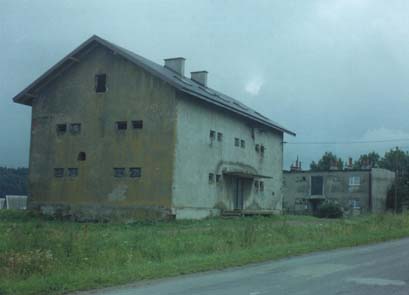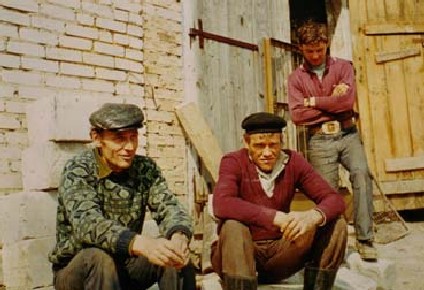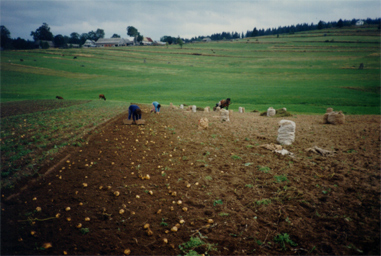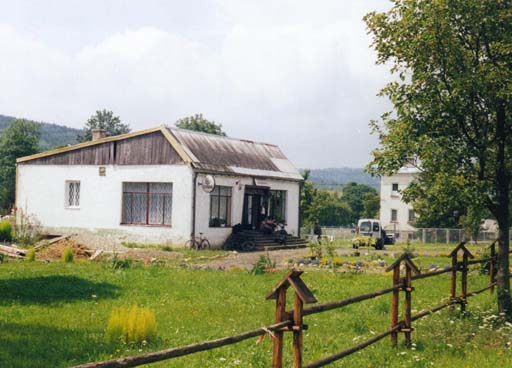| Return to main page |

Towards lunch they moved on eastwards. They noticed from the minibus that large areas of land were not being cultivated at all. 'That's a consequence of the Lemko deportations,' said the Professor'. Not all of their villages could be repopulated - some have disappeared forever. To fill the gaps the comunists tried to establish some state farms. They invested in large buildings and urban-style accommodation for the workers. But these farms were not very successful anywhere in Poland, and here in this upland environment they never stood a chance of being competitive. So they were dissolved soon after the end of communism. In one case near here, I heard that an Italian entrepreneur has leased the land and equipment, with the intention of producing veal for the market in Italy. But in most cases the farms are just disintegrating. The people who worked on them get by partly by working on their private allotments and partly from state benefits. It's all very sad.'
They entered an expansive valley containing a mixture of old and new houses, thinly scattered alongside the road. The Professor said that this had been one of the largest villages in the region before the devastation of the 1940s, with several thousand inhabitants. Now it was home to no more than a few hundred, mostly Poles, the majority of whom were very poor. The village still lacked a piped water network, though some of the more enterprising families had improvised private solutions. The students pitched their tents by a stream in the centre of the valley. The water here looked clean enough, but when they walked upstream they came across a group of women doing their washing in it. Scruffy small children were playing amidst the chickens. Dr. Dylagowa asked after the men. 'Up in the potato fields,' came the reply. 'We start the harvest tomorrow, and we could do with some extra hands!' 'We'll be happy to help you,' said the Professor.
That afternoon and evening were spent quietly. They visited the village headman, whose wife served tea and some sort of cheesecake. Dr. Dylagowa asked him to explain the position of 'headman' and he looked embarassed. He had not wanted the job, he said. It wasn't so much the work, because there wasn't a lot to do, just forms to fill in from time to time; but every so often there was something unpleasant between neighbours, and people looked to him to be the peacemaker. 'Couldn't other people do that? Does it have to be the headman?' asked Tom. 'It could be someone else,' agreed the headman, 'but in village life today, no one likes to get involved in other people's business, and so they leave it to me. Of course I don't have any power to enforce my suggestions, but they mostly go along with them all the same. I have to go to the big council meetings in the commune centre, and I report back to the village if there's anything important happening. That's about it really.'

Figure 50: The village headman (left)
With seventeen hectares of land, this was one of the largest farms in the village. The headman had recently divided his fields between his sons, and a new house for the eldest one had been completed a short distance away. This year, however, they were still producing and consuming together and the headman himself took charge of all machinery maintenance, using the skills that he had acquired as a migrant worker in his youth. He and his sons were critical of the state's agricultural policies. It was hardly worth producing milk any longer, they said, they were thinking seriously about selling their five remaining cows, though they would never sell the land itself. 'We thought we were the victims back in the communist days, and so we were. They wouldn't let anyone own more than ten hectares in those days. Now you can own as much as you like, but when they tried to privatise the state farms around here they couldn't even give the land away. Who wants to own land when there's no prospect of making a living from it? When I go to the market in Sanok, that's fifty kilometres from here, and see the shops full of foreign food, it makes me wonder what we've got a government for. They're out to destroy the independent Polish peasant. And then you'll see, British and German firms will move in, and if we're lucky, then our grandchildren will get a job with them. We survived communism, but our days are numbered under capitalism. Everyone in this village is against joining Europe if it means that foreigners can move in and buy our land for peanuts.
The students discussed these views later around a campfire. Ania voiced her surprise that opinions in the countryside seemed more gloomy those she had heard in the city. 'Wait a moment,' said the Professor. 'There are plenty of older people in the cities who share this headman's negative feelings about capitalism. The difference is that here in the countryside the gloom seems to dominate among the young people as well.' Marek expressed the view that farmers had no cause for complaint. 'These people only really have to work for about four months a year. All the rest of the time they're free to do what they please. That's why alcoholism is much a problem here. The price of vodka has risen sharply, but consumption has not fallen at all.'
'These social problems are painful, but inevitable,' said Dr. Dylagowa. 'Because the Polish communists were too weak to complete collectivisation, our countryside changed much more slowly than the peasant societies in other parts of Eastern Europe. People here carried on having lots of children, and farming on little more than a subsistence basis. So now we have a very high proportion of the population living in rural areas, and of course that cannot be efficient. It has to change when we enter the European Union.'
'But what's going to happen to these children?' asked Tom.
'Their best hope is the tourism industry.' said the Professor. 'Either that, or putting on a border guard's uniform to protect the boundaries of 'Fortress Europe' against all those Russians and Ukrainians who would like to infiltrate it.'

Figure 51: Work in the potato field (photo courtesy of Frances Pine)
The next day was potato harvest day. The students spent a full twelve hours in the fields, working in turn on the plots of several families of close kin. Lunch was a watery soup brought out to them in a bucket by one of the younger wives. Ania was again distressed at what she considered to be abuse of the horses, but the farmer laughed at her reproach. She had other reasons, too, for feeling angry. This farmer did not himself share in the most gruelling work, bending down to extract the potatoes from the grooves cut by the horse. He was, however, on his feet for most of the day guiding the horse, and transporting the potatoes back to the farm. Not so the Professor, who disappeared after an hour and was not seen again until they met back at the camp in the evening. 'I had a very exciting interview with a new priest in the next village,' he told his wife, but she ignored him as she cleaned the dirt and splinters from under her nails. Their hosts had been too busy all day to prepare a meal. Now they ate a simple egg dish and washed it down with tea and vodka. Dr. Dylagowa declined the offer of two ducks as a gift. 'How could we possibly take food away from a family as poor as that?' she asked later. 'Anyway, how would we cook them here?'

Figure 52: The village shop (of socialist construction, privatized in 2000)
| Return to main page |